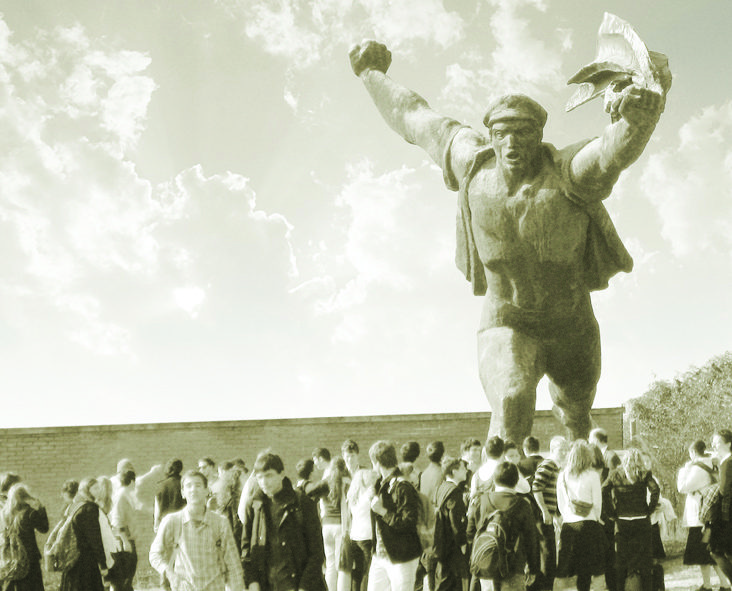The Power of Thought

Communism came to Hungary as the Iron Curtain lowered across Central and Eastern Europe. The communists lost the post-war elections but gained power with what they called “salami tactics”: dividing and conquering their democratic opponents. Upon his ascent, Mátyás Rákosi, an unpleasant little man who resembled Uncle Fester from the Addams Family, began a series of brutal crackdowns with the help of his sadists in the secret police, the State Protection Authority.
One victim was Edith Bone. Born in Hungary, but possessing British citizenship, Bone had turned to communism out of revulsion at the “bottomless misery of the poor”. A polyglot, she roamed about Europe supporting Marxism. Still, while being loyal to the Soviet Union, she was also curious and obstinate. “First of all, I like to tell the truth,” she wrote afterwards, in her book Seven Years Solitary, “Secondly, I like to give my opinions—both tastes which were not encouraged in the Party.” It is not to her credit that she remained a communist, but she was far too much of a character to be a mindlessly dedicated one.
While in Hungary in the late ‘40s, Bone fell under state suspicion. Someone with her foreign links and her bad attitude was a natural target for the secret police. She was arrested and accused of espionage. A friend who had allowed her to stay with him was shipped off to the camps for harbouring a spy.
The communist police liked to torture people. They knew that torture is not just about what is done but what is not done. As Bone wrote in her book:
They…left it to [their prisoners’] own bodies to torture them. If you are deprived of proper, wholesome and sufficient food, of light, of warmth, of sleep then after a certain time your whole body revolts. From the torturer’s angle, this is a very convenient method, saving much trouble and exertion.
There were other methods, though, by which torture could be enacted without the torturers having to strain themselves. Food was contaminated, with “obscene and unpleasant” effects. Handcuffs were imposed and then progressively tightened around her wrists. Bone was moved to a better cell, with better meals, and a more comfortable bed, and then encouraged to give up her “secrets” or be moved right back again. In Seven Years Solitary, Bone freely admits that other prisoners faced worse violence and were often tortured to death. Her British passport helped to keep her alive. Still, it was extraordinarily cruel treatment of a human being—indeed, not just a human being but an arthritic, 60-year-old woman.
Her captors must not have appreciated the kind of arthritic 60-year-old they were imprisoning. If she had been troublesome before, she now became a pillar of single-minded stubbornness. She was intent on maintaining her pride and sanity. The torture, she knew, was intended to break a victim down in order to elicit a confession. She was not going to give the communists the satisfaction.
Throughout Seven Years Solitary, her argumentative, mischievous nature shines. “I am not a dog,” she snaps at a soldier who leaves her plate of food on the floor. At one point, one of her interrogators told her she would not leave captivity until she admitted to being a spy. “In that case I shall probably die here.” But Bone also had a sense that she was representing something beyond herself. She “regarded the matter as a challenge, not only to myself but to that higher civilization of which I considered myself as a product.” So, she recited poetry in her head, and mentally created poems of her own. She embarked on tours, in her imagination, of cities she had visited. She used her knot-tying skills to prise a nail from her prison door with a cord, and managed to create a pinhole through which she could peer out into the hall beyond her cell to catch priceless glimpses of her fellow prisoners.
Bone’s conditions eventually eased. She claims that she decisively rejected communism after being appalled by the blatant absurdities and lies she found in Soviet newspapers and medical literature in the prison library. Having been led to communism by the inhumanity she saw around herself, moreover, she could not embrace the inhumanity it had replaced it with. “Indeed it was a worse tyranny than the pre-revolutionary autocracy had ever been,” she wrote, “Because the gendarmes of the Tsar had concerned themselves mainly with political activities, whereas Soviet tyranny penetrated into the private personal life and even into the minds of people.”
Yet it was the lies more than the cruelty that seem to have offended Bone. “The constant barrage of lies presented as the one sterling truth…meant that all standards were falsified, twisted out of shape.” This was true in an epistemological sense and also in an aesthetic one. “As a result of seeing mediocre writers praised to the skies if they were on the Party line…young people ceased to be able to distinguish good and bad writing.”
Against this tyranny of mistruth and mediocrity, Bone set her admirable mind. Can we know that every claim in her book is true? I suppose not. But we know she disappeared into the Hungarian prison system for years and emerged strong and sane enough to denounce communism for the cameras and write her inspiring book. None of us face the cruelty that Bone resisted. But her example should inspire us to uphold the power and dignity of thought, and wit, and independent-mindedness against dishonesty, and against mediocre standards, and against the temptation to drown our minds in comfortable pleasures. To do otherwise is not just to deprive ourselves of intellectual fulfilment but to betray our own potential, and to betray the gift we have been offered by civilization. If Edith Bone could be true to herself, we have no excuse.
Ben Sixsmith is a British writer living in Poland who has written for Quillette, the Spectator USA, the Catholic Herald, Public Discourse, and Unherd.
Comments